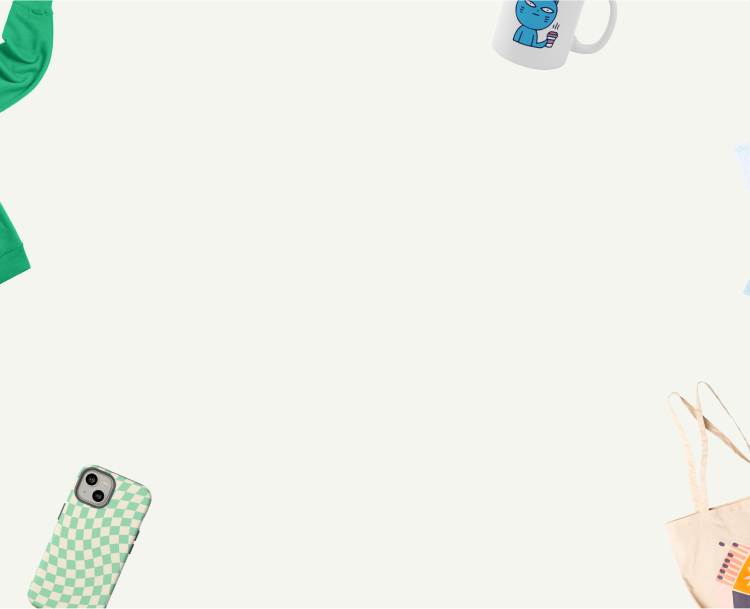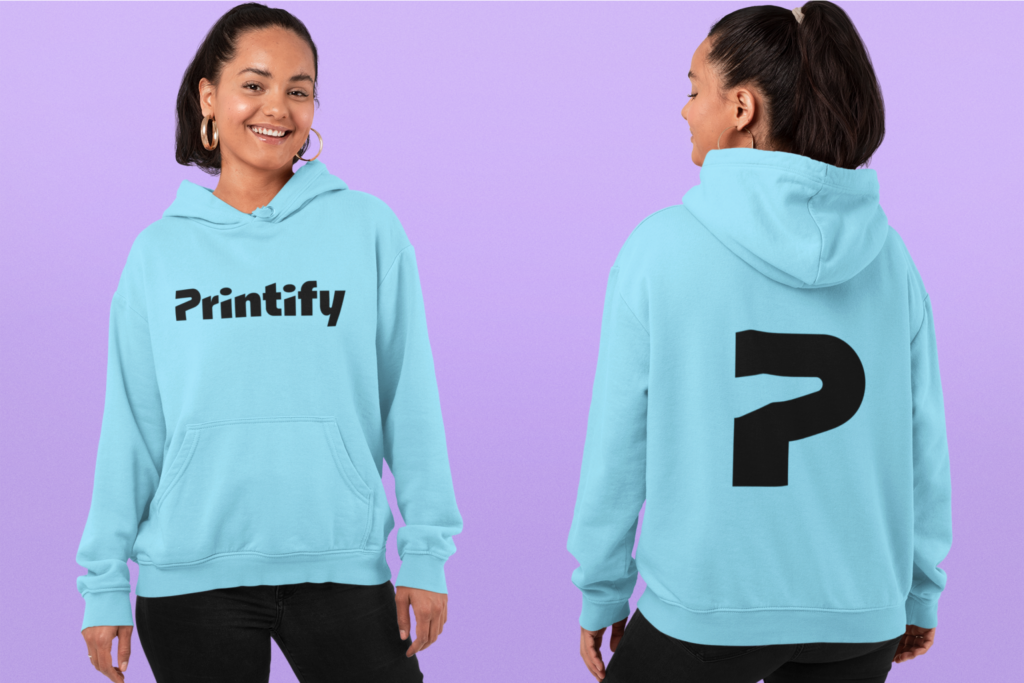Sell custom products with Printify
Looking for Redbubble alternatives that let you keep more of your profits? You’ve probably come across popular print-on-demand (POD) sites like Printify, Printful, TeePublic, and many more. These are all solid options, but which one is actually right for you?
In this guide, we’ll break down the best Redbubble alternatives based on your goals – higher income, more creative freedom, or just a simpler way to sell.
Key takeaways
- To find the best alternatives to Redbubble, you should compare each platform’s product range, pricing, shipping options, design tools, and customer support.
- POD fulfillment partners like Printify and Printful give you more control over profits and product quality.
- Marketplaces like TeePublic and Zazzle help you tap into built-in audiences without needing your own store.
- All-in-one platforms such as Sellfy and Fourthwall combine storefronts, Print on Demand, and marketing tools.
- Niche POD platforms like Podbase or Displate let you stand out with unique or premium products.
What should you look for in Redbubble alternatives?

Here’s what to compare when choosing the best Redbubble alternative for your business:
- Product range. Does this platform offer items that suit your audience, and will customers be happy with the product quality?
- Base production costs. Can you control your selling price and keep healthy profit margins, considering the platform’s pricing structure?
- Shipping speed and global reach. Can you deliver to customers worldwide without long wait times or high shipping costs?
- Ease of design and customization. Is it easy to upload your designs and customize your print-on-demand products using the platform’s existing tools?
- Sales channel integrations. Does it connect to multiple platforms you use to sell products, like Shopify, Etsy, or eBay?
- Reliable customer support. If something goes wrong, can you get helpful support for both you and your customers?
- Copyright and licensing transparency. Are the platform’s rules around ownership and content use easy to understand?
- Seller-friendly payout methods. Can you get paid on schedule, without delays or complicated payment rules?
The 20 best Redbubble alternatives
We’ve curated this list of the top alternatives to Redbubble based on our own testing, market research, and feedback from real creators.
Whether you’re looking for better product quality or more competitive pricing, these platforms are excellent alternatives for your print-on-demand business.
1. Printify

Best for: Creators who want to earn more and sell through their own online store.
Redbubble doesn’t let you connect to third-party sales channels, but Printify does. Our service integrates with popular eCommerce platforms like Shopify, Etsy, and WooCommerce, so you can build your shop on your own terms.
Unlike Redbubble, which charges platform fees based on your account tier and monthly earnings, Printify never takes a cut. Sellers simply pay for the base production costs, set their selling price, and keep the rest.
Pros:
- Higher profits, no platform cuts. Keep all your markup with no unexpected fees. Sellers can also upgrade to Printify Premium to get up to 20% off base product prices.
- Global Print Provider network. Choose from over 90 different Print Providers in North America, Europe, Asia, and Australia – or let us auto-assign based on performance and quality.
- Over 1,300 customizable products. From custom t-shirts and mugs to wall art and stationery, you’ll find everything you need to grow your product line and reach more customers.
- Printify Pop-Up Store. Don’t have an online shop yet? Simply launch a free, branded storefront in minutes – no tech skills needed.
Cons:
- No in-house printing. We partner with vetted Print Providers, which means there may be varying print quality depending on the region. But feel free to order samples of our custom t-shirts and other items to see which ones meet your standards.
2. Printful

Best for: Artists who want custom branding and tight quality control.
One of Redbubble’s biggest limitations is the lack of branding options. With Printful, sellers can add custom pack-ins and packaging to orders to build a recognizable brand identity.
Printful handles most of its own printing in-house, meaning you get tighter quality control and a more consistent customer experience.
Pros:
- Quick Stores. Just like Printify’s Pop-Up Store, this feature lets you build a storefront quickly – no need for an eCommerce platform.
- Premium print quality. Printful offers industry-leading technology, including unlimited-color embroidery and its own DTFlex method for smoother results than standard direct-to-film (DTF).
- Wide product range. Offers over 445 items, from apparel and accessories to pet gear and metal prints – far more than Redbubble.
Cons:
- Limited global coverage. Printful’s in-house network is strong, but not as globally distributed as Printify’s Print Providers.
3. Zazzle
Best for: Designers, photographers, or lettering artists looking to sell their own paper goods.
Like Redbubble, Zazzle is a print-on-demand marketplace, but it’s best known for its personalized paper goods, gifts, and party supplies. Sellers can set their own royalty rates, which are added to the production costs to determine the final price of the product.
While Zazzle doesn’t integrate with online selling sites, it lets you track performance through Google Analytics, helping you understand your potential for business growth.
Pros:
- Flexible earnings. Independent creators can set their own royalties, up to 50% on most physical products and up to 99% on digital downloads.
- Referral commissions. Join Zazzle’s affiliate program to earn extra income by promoting your own designs.
- Paper-friendly printing methods. Including foil, engraving, letterpress, and clean digital printing.
Cons:
- Very niche. Zazzle is known for its paper goods, so it doesn’t attract as much traffic as other, more general print-on-demand websites like Redbubble.
4. Sellfy
Best for: Sellers who want an all-in-one POD and eCommerce platform.
Sellfy combines a full online store builder with built-in POD tools to simplify the selling process from start to finish. Anyone can buy a domain, design a storefront, and list custom products in one user-friendly interface – no need to switch between platforms.
Pros:
- Full control over storefront and branding. Sellfy lets users fully customize their storefront, giving them complete control over their brand’s appearance.
- Integrated marketing tools. The platform includes built-in tools for email marketing, discount codes, and upselling.
- Supports both digital and physical products. Sellfy gives creators the flexibility to diversify their product offerings.
Cons:
- Subscription costs. Unlike most print-on-demand platforms, Sellfy charges a monthly fee starting at $22/month.
- Limited POD features. There are fewer printing options and no design tools, making it less flexible than other Redbubble alternatives.
5. Spreadshirt
Best for: Creators who want a built-in marketplace with the option to run a custom storefront.
Looking for websites like Redbubble that let you sell on a ready-made online marketplace? Spreadshirt does just that. This print-on-demand platform lets anyone create and sell custom apparel and accessories with no upfront costs.
One major difference from Redbubble is that Spreadshirt also offers Spreadshop – a personalized storefront you can customize to match your brand identity.
Pros:
- Wide product selection. Over 350 items, including embroidered products not offered on Redbubble.
- 90-day free returns. Customers get more peace of mind when buying.
- Multiple sales channel support. Sellers can connect Spreadshirt with popular eCommerce platforms like Etsy or Shopify.
Cons:
- Limited production facilities. There are only four production sites located in Europe and the US.
- Inconsistent printing quality. User reviews mention that the final outcome can vary depending on the item or order.
6. Gelato
Best for: Sellers who want advanced tools to quickly scale their print-on-demand business.
Gelato looks like most POD platforms at first, but unlock Gelato+ – starting at $19.99/month – and it quickly sets itself apart. Along with global reach and high-quality products, you get access to smart digital tools to grow your business.
One standout feature is Instant Collections, which uses AI to generate multiple custom-designed items, optimize their listings, and set their prices simultaneously. This way, you can launch entire product lines in minutes.
Pros:
- Global fulfillment. Over 140 print partners in 32 countries for faster, local delivery.
- Big brand products. Sell gear from popular names like Nike, Champion, and Under Armour.
- Realistic mockups. Generate polished product previews and even 3D renders using Gelato’s user-friendly design tools.
Cons:
- Branding costs extra. Custom labels and packaging extras are only available with a paid subscription.
7. Saatchi Art
Best for: Professional artists selling premium wall art prints.
If you’re a serious artist looking beyond Redbubble’s casual crowd, Saatchi Art offers a more elevated space. While best known for their original paintings, photography, and sculpture, they also offer a POD service for art prints.
Pros:
- Artist-friendly terms. Free to join, and you earn 60% of the profit on each print sale.
- Non-exclusive. You retain full rights to your work and can sell it elsewhere.
- Curated audience. Great visibility among art buyers and collectors.
Cons:
- Artwork only. No t-shirts, mugs, or accessories – just made-to-order prints or your own originals.
8. TeePublic
Best for: Anyone wanting to sell custom products in a fan art-friendly marketplace.
If you’re looking for sites like Redbubble that support fan art, TeePublic is a strong contender. This print-on-demand marketplace has official partnerships with major pop culture brands, and it frequently promotes designs tied to trending fandoms and events.
Artists can sell t-shirts, hoodies, stickers, accessories, and home goods – without handling production or customer service.
Pros:
- Straightforward platform. TeePublic’s simple upload and product setup process makes it easy for creators to start selling quickly.
- Frequent sales promotions. TeePublic runs regular site-wide sales that increase visibility and drive higher sales volumes for artists.
- Artist-forward platform. TeePublic highlights creators through categories like “Creators to Watch,” “Black Artists,” “Women Artists,” and more to help you reach new audiences.
Cons:
- Fixed pricing. Artists have no control over product pricing, as TeePublic sets fixed prices for all items and offers a set royalty for each sale.
- Lower profitability ratios during sales. During TeePublic’s frequent discounts, the royalties for independent artists are reduced, which can affect overall earnings.
9. Fine Art America
Best for: Talented artists who want to start selling museum-quality prints and other custom merchandise.
Like Saatchi Art, Fine Art America focuses on wall art but with more flexibility. Besides fine art paper and metal prints, artists can turn their work into t-shirts, phone cases, puzzles, tote bags, and even holiday ornaments.
Pros:
- Premium materials. Print on museum-grade options like archival matte, glossy photo paper, or textured Somerset Velvet for a professional fine art finish.
- Global fulfillment. Fine Art America prints and ships orders from 16 production centers across five countries to reach customers worldwide.
- Built-in analytics. See who’s viewing your work and what’s getting attention, all from your dashboard.
Cons:
- Limited reach for new artists. With so many established sellers, it can be challenging for new creators to gain exposure on Fine Art America.
10. Podbase
Best for: Creators who want to sell tech-focused print-on-demand products.
Podbase is one of the few Redbubble alternatives built specifically for tech gear. Think custom phone cases, laptop sleeves, and AirPods cases. It’s a smart pick for standing out in a high-demand niche where shoppers are often willing to pay more for design and protection.
While branding options are limited, you can bundle items like screen protectors and phone grips to boost your average order value.
Pros:
- Tech-first focus. It’s easier to stand out in a niche like custom tech accessories. Plus, customers often expect to pay more for personalized protection.
- No paid plans. Sign up and start selling without monthly fees or upgrade tiers.
- eCommerce integrations. Easily connect to Shopify, Etsy, or WooCommerce.
Cons:
- Sample orders require effort. Sellers need to load $20 into their wallets and contact support to access a one-time sample voucher.
11. Spring by Amaze
Best for: Creators who want to sell personalized products directly through social media platforms.
Formerly known as Teespring, Spring is one of the go-to print-on-demand sites for content creators. You can sell a broad range of physical and digital products and promote them directly through integrations with TikTok, YouTube, Discord, Twitch, and more.
Pros:
- Social media integrations. Sell directly on TikTok, YouTube, Twitch, Discord, and more.
- Marketing tools included. Create promo codes and personalized storefronts to increase engagement and conversion.
- Free all-over-print patterns. Use Spring’s provided templates to easily create full-coverage designs for your print-on-demand products.
Cons:
- High base prices. Spring doesn’t charge upfront fees, but a basic t-shirt starts at around $15.32 – almost twice the cost of a similar product on other platforms like Printify.
12. Printaura
Best for: Sellers who want basic print-on-demand features with custom branding options.
Printaura is a no-frills print-on-demand alternative to Redbubble, but with more control over packaging and fulfillment. While the interface feels dated, it connects with existing eCommerce stores on Shopify, WooCommerce, and Etsy.
Pros:
- Easy integrations. Connect your Shopify, WooCommerce, or Etsy store in just a few steps.
- Custom branding. Add neck labels, packaging inserts, size stickers, and more to build a branded customer experience.
Cons:
- Clunky navigation. The dashboard layout is outdated, and browsing products isn’t as smooth as on other alternatives to Redbubble.
13. Threadless
Best for: Talented artists who want to join a supportive creative community and monetize their designs.
If you’re looking for print-on-demand sites like Redbubble but with more community features, check out Threadless. Besides uploading designs to sell on stickers, t-shirts, framed prints, and accessories, you can also open a Threadless-powered online store and join design challenges to grow your visibility.
Pros:
- Customizable artist shops. Threadless gives you a free online store to list your products and establish a brand identity.
- Threadless marketplace. Gain exposure to a wider audience by opting into the main print-on-demand marketplace, where millions of fans browse for new art.
- Design challenges. Participate in regular contests that give extra exposure, cash prizes, and a chance to get featured by Threadless.
Cons:
- Limited print methods. Threadless only supports direct-to-garment (DTG), sublimation, and giclée printing – fewer options than other alternatives to Redbubble, like Printify or Printful.
- No marketplace integrations. Sellers can’t link their shop to Etsy, Amazon, or eBay, so everything stays within the print-on-demand platform.
14. Displate
Best for: Designers, illustrators, or artists who want to sell high-end metal posters.
Displate is a print-on-demand platform built for one thing: metal posters. With over 40,000 artists and strict quality controls, it’s a strong alternative to Redbubble for selling original designs on durable, high-quality prints.
They also partner with major entertainment brands to sell their officially licensed artwork.
Pros:
- High-quality metal art prints. Displate’s products are renowned for their durability, vividness, and tactile appeal. Every piece includes a hologram of authenticity and safe mounting.
- Limited Edition options. Offer collectors exclusive prints with 3D textures, special inks, or selective finishes.
- Boost your income. Earn 41% commission on sales made through your custom referral links within 30 days.
Cons:
- Fixed earnings and pricing structure. Artists earn a set amount per sale – for example, $9 for a large-size poster – and it’s reduced by taxes, fees, and discounts.
15. Viralstyle
Best for: POD sellers who want built-in tools to optimize their marketing efforts.
Viralstyle is a Redbubble alternative that combines a marketplace with advanced campaign features to help sellers increase their earnings.
You can group products into themed campaigns, test print-on-demand pricing, and even connect email marketing tools to stay in touch with buyers after checkout.
Pros:
- Campaign tools. Bundle related products into limited-time themed campaigns, set how long they’re available, and add upsells to boost your average order value.
- Email marketing integrations. Easily connect your campaigns to top email platforms to follow up with buyers.
- Built-in split testing. Test pricing, styles, and colors on live campaigns to optimize performance.
Cons:
- Dated interface. The platform offers robust features, but the dashboard and design tools feel less modern than those of other alternatives to Redbubble.
16. CafePress
Best for: Creators who want to sell print-on-demand products through their own store and a global marketplace.
CafePress is one of the original platforms for selling custom merchandise online. You can upload your designs to products like t-shirts, mugs, and home decor, and sell them through your own CafePress store or on their global marketplace.
Pros:
- Large product range. Sell your designs on over 450 items, from apparel to home decor and stationery.
- Custom storefronts. Create your own online store without inventory and with full pricing control.
- Global reach. CafePress has dedicated marketplaces for the US, UK, Canada, and Australia.
Cons:
- Low marketplace royalties. You only earn 5% per sale on items sold through the CafePress marketplace.
- Limited payment countries. Only sellers in select countries can receive royalty payments from the CafePress marketplace.
17. Custom Ink
Best for: Selling to groups or businesses ordering in bulk.
Custom Ink is a print-on-demand platform known for its high-quality printing and bulk discounts. It’s ideal for ordering merch for a team, event, or business – especially since you can invite group members to pick their own sizes and pay individually.
While most of their pricing favors bulk orders, they also offer select products with no minimum requirements.
Pros:
- High-quality printing. Offers screen printing, digital, embroidery, and laser engraving. The team will choose the best method based on your product.
- Helpful customer support. Phone and live chat assistance with human agents available.
- User-friendly design tools. Includes ready-to-use clipart and custom fonts if you don’t have artwork ready.
Cons:
- Expensive for small orders. For example, a single Gildan Softstyle Jersey T-shirt can cost you $32.25, while ordering 500 brings the price down to $7.11 each.
18. Gooten
Best for: Sellers who want to scale with high-volume, multi-channel sales.
If Redbubble’s built-in marketplace traffic isn’t enough for your goals, Gooten gives you more control. It’s designed for serious sellers who want to build their own brand and sell on their own online stores or popular marketplaces.
Pros:
- Multi-platform support. Integrates with Shopify, Etsy, Amazon, TikTok, Squarespace, BigCommerce, and Ecwid.
- VIP program for high-volume sellers. The Very Important Merchant program includes faster support, exclusive webinars, and product discounts.
- Diverse decoration methods. Offers everything from DTG and DTF to embroidery, foil, laser engraving, and 3D UV printing.
Cons:
- Limited global production. Most products are printed in the US, with only a few international facilities in the UK, Spain, Canada, and Australia.
- Design tools require add-ons. If you want personalization or clipart libraries, you’ll need to integrate Customily, which only works with Shopify or Etsy.
19. Fourthwall
Best for: Content creators looking to monetize their own website.
Used by popular creators like MKBHD and Philip DeFranco, Fourthwall is more than just a merch platform. It aims to help content creators sell custom products, grow their audience, and even offer subscriptions – all from one place.
Pros:
- Powerful free plan. Set up a custom-branded site with your own domain, launch promos, run giveaways, and offer paid memberships, all at no cost to start.
- Unique print-on-demand products. Go beyond standard merch with options like plush toys, lapel pins, and artisan keycaps.
- Social selling integrations. Connect to TikTok Shop, YouTube Product Shelf, Facebook and Instagram Shops, and Twitch Gifting.
Cons:
- Minimums for select items. A few custom products, such as plushies, may require a minimum order quantity to produce.
20. Merchize
Best for: Sellers who want unique product options and flexible branding.
Merchize is a strong Redbubble alternative for selling both everyday apparel and creative, niche-friendly items. From Hawaiian shirts to photo night lights and custom-shaped suncatchers, it’s perfect for launching designs that stand out.
You can also build a Merchize-powered storefront – starting at $79/month – or connect the platform to your existing Etsy, Amazon, or Shopify store.
Pros:
- Specialty product catalog. Sell unique items like hologram shaker keychains, tattoo stickers, bookshelf signs, and wooden piggy banks.
- Branding options included. Add your own logo to labels, hang tags, message cards, and packaging.
- One-day production category. Speed up shipping with a dedicated group of fast-fulfillment items.
Cons:
- Limited country coverage. Some destinations aren’t supported, so check the restricted shipping list before launching.
Quick comparison: Top websites like Redbubble

Use this quick-reference table to compare and determine which Redbubble alternative best suits your goals.
| Platform | Model | Connects to sales channels | Free to start | Best for |
| Printify | POD fulfillment partner | Yes | Yes | Profit-focused creators |
| Printful | POD fulfillment partner | Yes | Yes | Quality-focused sellers |
| Zazzle | Marketplace | No | Yes | Paper goods and gift sellers |
| Sellfy | Storefront + POD | No | No – from $22/mo | Digital and physical product sellers |
| Spreadshirt | Marketplace + storefront | Yes | Yes | Selling via a marketplace or a store |
| Gelato | POD fulfillment partner | Yes | Yes | Scaling with global fulfillment |
| Saatchi Art | Marketplace | No | Yes | Fine artists selling prints |
| TeePublic | Marketplace | No | Yes | Fan art and pop culture designers |
| Fine Art America | Marketplace + storefront | Yes | Yes | Selling high-end wall art |
| Podbase | POD fulfillment partner | Yes | Yes | Tech accessory designers |
| Spring | Marketplace + storefront | No | Yes | Selling merch on social media |
| Printaura | POD fulfillment partner | Yes | Yes | Selling with branded packaging |
| Threadless | Marketplace + storefront | No | Yes | New artists building exposure |
| Displate | Marketplace | No | Yes | Selling premium metal prints |
| Viralstyle | Marketplace + storefront | No | Yes | Selling on a marketplace with marketing tools |
| CafePress | Marketplace + storefront | No | Yes | Selling via a marketplace or a store |
| Custom Ink | POD fulfillment partner | No | Yes | Bulk merch for teams and events |
| Gooten | POD fulfillment partner | Yes | Yes | High-volume multi-channel sellers |
| Fourthwall | Storefront + POD | Yes | Yes | Creators selling merch |
| Merchize | POD fulfillment partner | Yes | Yes | Selling unique print-on-demand products |
Other print-on-demand sites like Redbubble
Besides these top 20 sites, check out these Redbubble alternatives:
- Amazon Merch on Demand
- Printbest
- CustomCat
- TeeFury
- BustedTees
- Prinstome
- ArtsAdd
- UltraPress
- Inkthreadable
- Gear Launch
- Instaprints
Choose Printify as your Redbubble alternative

With no upfront costs, the ability to keep 100% of your profits, and a Catalog of over 1,300 customizable products, Printify gives you more freedom to grow your brand than any other Redbubble alternative.
1. Sign up and choose a product
Create a free Printify account and explore our Product Catalog. Each product page includes details about the Print Provider, base price, and production time, so you can choose the best fit for your needs.
2. Add your design
In the Product Creator, upload your own artwork or try our built-in tools like the AI Image Generator, ready-made graphics, fonts, and premium assets.
3. Connect your online store
Easily integrate with platforms like Shopify, WooCommerce, Squarespace, or online marketplaces like Etsy, Amazon, and eBay. Your Printify products will sync automatically to your store.
4. Start selling
Once your store is live, we’ll handle printing and shipping. You focus on creating and promoting – Printify takes care of the rest.
FAQ
Depending on your goals, many Redbubble alternatives offer better control, higher profit margins, and more customization.
Top platforms include Printify and Printful for selling on your own store, as well as TeePublic and Threadless for artist-friendly marketplaces.
Redbubble has become more expensive because of the new fee structures and sellers increasing their markups to compensate for the reduced profit margins. These changes affect both creators and customers, resulting in more expensive products overall.
Yes, it’s possible to earn $1,000/month on Redbubble, but it’s not easy. You’ll need a large catalog of high-quality designs, strong SEO, and consistent promotion outside the platform. Due to heavy competition, relying solely on Redbubble’s traffic usually isn’t enough.
No platform guarantees sales. However, switching from Redbubble to another print-on-demand platform like Printify can increase your earning potential through better profit margins, more branding control, and access to additional sales channels like Etsy or Shopify.
All this can lead to more visibility, stronger customer loyalty, and ultimately, higher revenue.
Summary
If you’re looking for a Redbubble alternative, these are the best options:
- Printify –Maximize profits by selling on your own store or an online marketplace.
- Printful – Custom products with in-house production and branding.
- TeePublic – Fan art-friendly marketplace with built-in audience.
- Sellfy – Sell digital and physical products from one storefront.
- Displate – Premium metal art prints for collectors and fans.
With Printify, you get higher profit margins, access to a large product range, and global fulfillment – all with no upfront costs. It’s the easiest way to launch a print-on-demand business.












